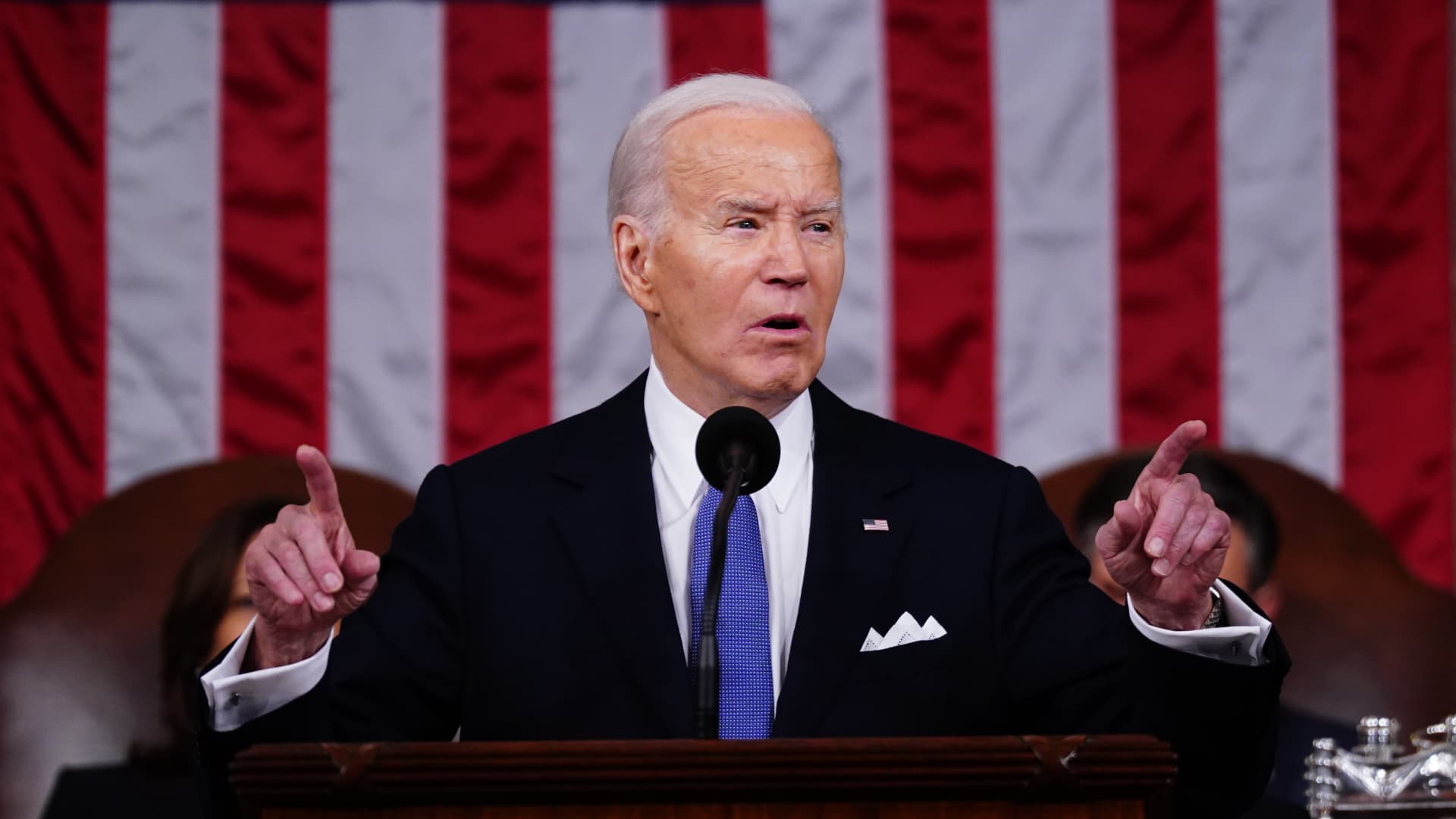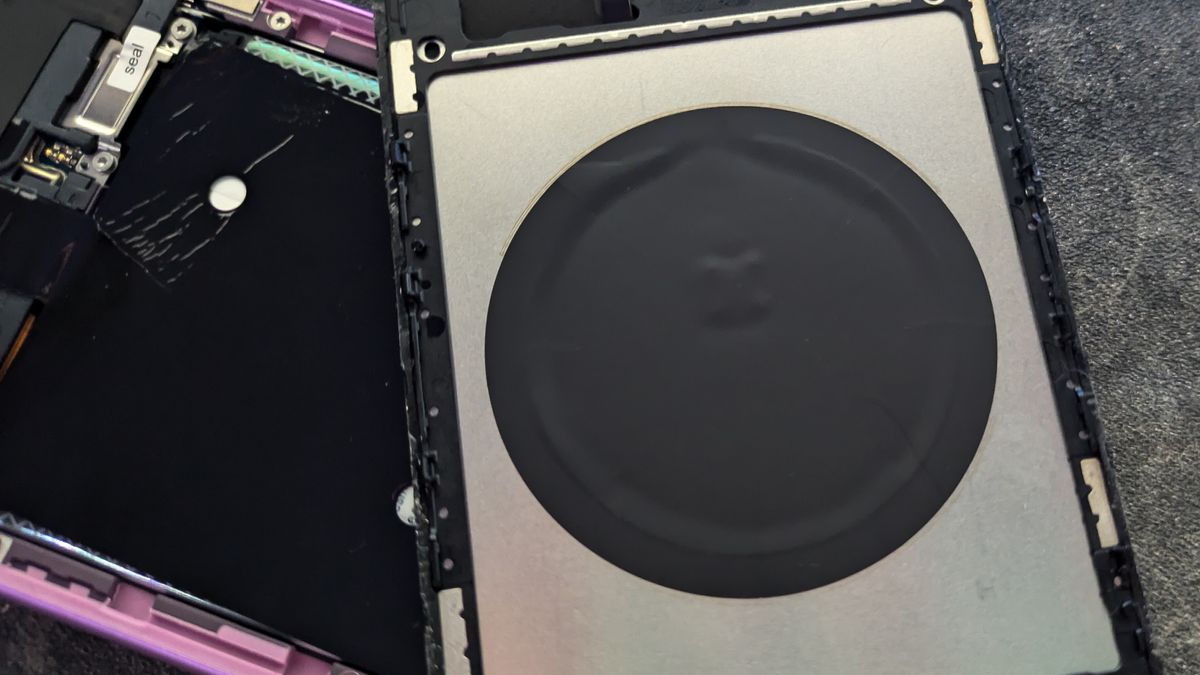US President Joe Biden delivers the State of the Union address in the House Chamber of the US Capitol in Washington, DC, on March 7, 2024.
Pool | Getty Images News | Getty Images
President Joe Biden laid out plans to further reshape the tax system and promised to lower costs for Americans during his State of the Union address Thursday.
“I inherited an economy that was on the brink. Now our economy is literally the envy of the world,” Biden said.
Biden also sought to reclaim the mantle of economic populism that fueled his 2020 campaign, ahead of his likely rematch against Republican former President Donald Trump.
“The way to make the tax code fair is to make big corporations and the very wealthy finally pay their share,” said Biden.”A fair tax code is how we invest in the things that make this country great. Healthcare, education, defense, and so much more.”
The president reiterated his call for a so-called “billionaire tax,” a 25% minimum tax on unrealized income for households with a net worth over $100 million. First proposed by congressional Democrats in 2021 as a way to raise revenue for domestic spending plans, efforts to tax unrealized income of the very wealthy at higher rates have gone nowhere in Congress.
Nonetheless, the pitch still serves to fire up Democrats and to underscore what the White House sees as fundamental inequalities in the tax code.
Biden also pledged to end tax breaks for executive pay above $1 million, as well as tax code provisions that benefit large pharmaceutical and oil companies and the owners of private jets.
Biden promised to expand several of his administration’s most progressive economic accomplishments, including the new corporate alternative minimum tax.
President Joe Biden delivers the State of the Union address to a joint session of Congress at the U.S. Capitol, Washington, DC, USA, 07 March 2024.
Alex Brandon | Via Reuters
“Big companies now have to pay a minimum of 15%, but that’s still less than working people pay in federal taxes,” he said. “It’s time to raise the corporate minimum tax to at least 21% so every big corporation finally begins to pay their fair share.”
Medicare’s newly instituted powers to negotiate drug prices are another of Biden’s most significant economic wins.
“This year Medicare is negotiating lower prices for some of the costliest drugs on the market that treat everything from heart disease to arthritis,” he said. “Now it’s time to go further and give Medicare the power to negotiate lower prices for 500 drugs over the next decade.”
Biden’s regulatory agenda is a cornerstone of his economic platform, and he celebrated several elements of a successful effort crack down on junk fees.
“Too many corporations raise their prices to pad their profits, charging you more and more for less and less,” he said.
“That’s why we’re cracking down on corporations that engage in price gouging or deceptive pricing, from food to health care to housing.”
His administration in recent weeks has called on grocery stores to lower prices, and accused some companies of “shrinkflation,” a term used to describe the practice of reducing the quantity, size or weight of a product by an almost imperceptible amount, while keeping the price the same.
“In fact, snack companies think you won’t notice when they charge you just as much for the same size bag but with fewer chips in it,” he said.
Biden also proposed a mortgage tax credit of $400 a month for two years to help people buying a first home or “trading up for more space.”
Biden reminded viewers of the economic boost his administration has provided to domestic manufacturing with the passage of the bipartisan infrastructure law and the Chips and Science Act.
US President Joe Biden arrives to speak on rebuilding US manufacturing through the CHIPS and Science Act at the groundbreaking of the new Intel semiconductor manufacturing facility near New Albany, Ohio, on September 9, 2022.
Saul Loeb | AFP | Getty Images
He renewed his pledge that projects funded during his administration with federal dollars would be built by American workers with American materials.
Yet even as Biden celebrated the passage of landmark bills that are reshaping the U.S. economy, and years of low unemployment, slowing inflation and rising wages, hanging over Thursday’s economic message was the harsh reality that voters have yet to give Biden credit for many of these accomplishments.
According to a February NBC News poll, just 36% of voters approve of Biden’s handling of the economy. The same poll showed him trailing Trump by five points, 47% to 42% in a hypothetical general election vote.
“There’s more to do to make sure you’re feeling the benefits of all we’re doing,” Biden said.





















Discussion about this post